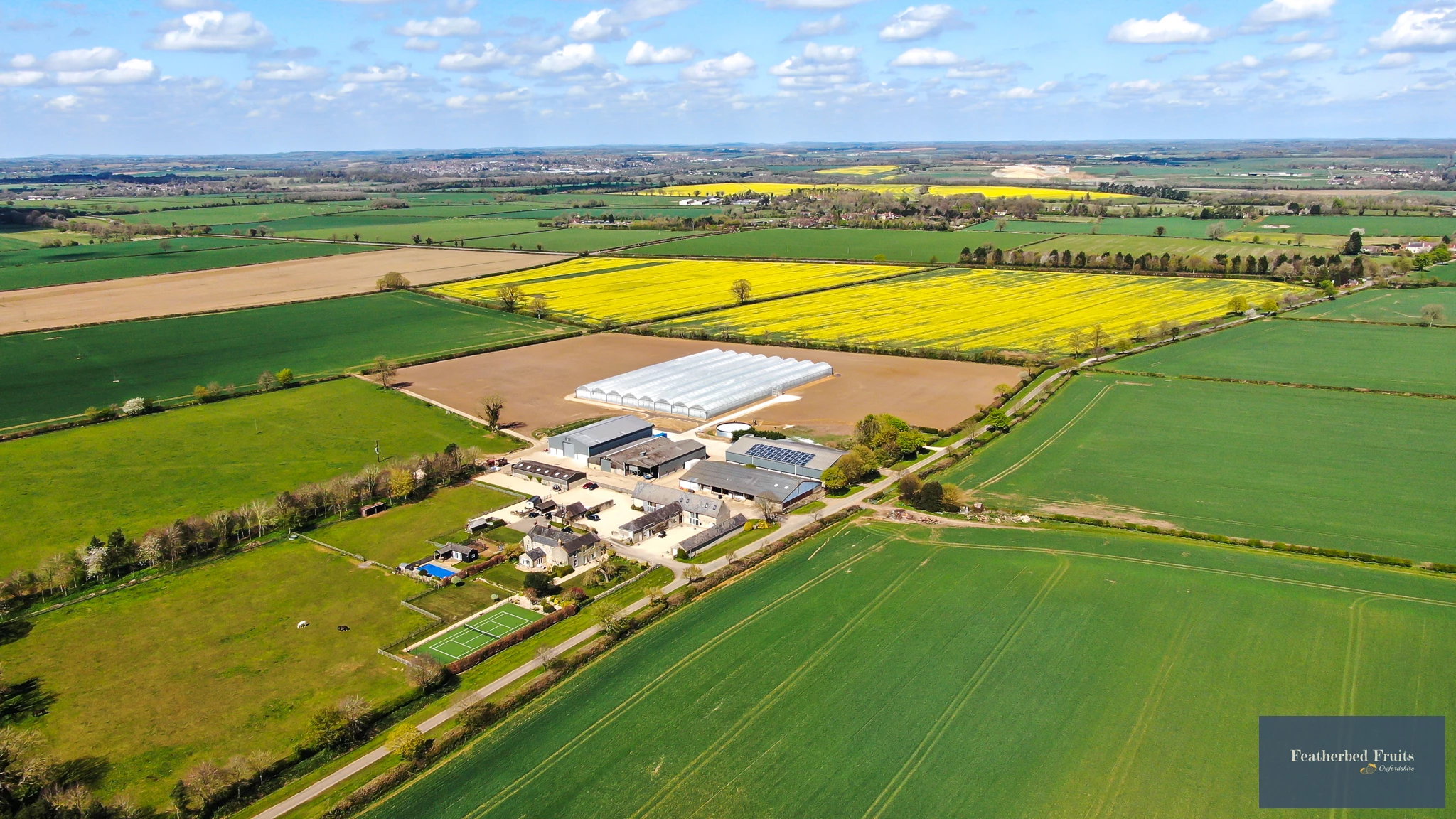
Partner Article
Oxfordshire farm's newly launched state of the art greenhouse set to serve up strawberries fit for Queens
A family-run farm in Oxfordshire which is using the very latest technology and innovative growing techniques to enable it to produce strawberries for nine months of the year has picked its very first fruits.
Middle Farm, in Mixbury, has diversified to launch Featherbed Fruits and has installed a state-of-the-art two-acre greenhouse which houses almost 80,000 strawberry plants. It has been run by the Rymer family for almost 100 years and farms a range of crops across just over 800 acres of land, also operating five B&B units, ranging from shepherd’s huts to luxury glamping tents, and a 7,000 sq ft office complex.
When looking for an alternative enterprise to continue to sustain the business, considering the current challenges in the industry and generate enough income for the family, third-generation farmer Harry Rymer looked into the possibility of growing soft fruits.
Property consultancy Fisher German was instructed to prepare and submit a planning application for two acres of polytunnels, and despite the plans being recommended for refusal by council officers, the firm’s planning team demonstrated the positive impacts the scheme would have to achieve unanimous approval.
This included the contribution towards a stable local food economy which is less reliant on global imports, the creation of 15 jobs and the impact on education, with school visits planned to educate children about locally sourced food in the future.
The first strawberry plants, made up of both Everbearing June-bearing crops, were planted in February 2022 in a hydroponic, soil-free system consisting of coconut husk and irrigated rainfall collected from the roof.
The temperature and humidity are monitored using a climate controller to ensure the optimum growing condition for the strawberry plants all year round. The double layer of poly for added insulation is also one of very few in the country and will help the farm reduce energy use.
The farm has now welcomed its very first strawberries and is working with a company which caters for large-scale sporting events, with the fruit set to be used at this year’s Queen’s Club Tennis Championship.
The forward-thinking project has also been shortlisted for an award in the South East Royal Town Planning Institute’s Excellence in Planning Awards, in the Successful Economy Award category.
Harry said: “When looking into diversification methods I wanted something which utilised new technologies to push boundaries and demonstrate that soft fruits can be grown almost all year round, with the greenhouse only being quiet between December and February.
“It’s a positive way to generate income and means that we can contribute to the country being less reliant on imports, something that will only become increasingly important in the future.
“Growing in coconut husks is an innovate technique which gives a complete blank slate, so we don’t have to investigate what is already in the soil and we’re less reliant on pesticides.
“After investing in the polytunnels and equipment, we also wanted something which could generate a good income in our first year, so we’re very happy to see our very first strawberries ripen.
“Utilising new technologies is certainly the future of farming and something which more people in the industry need to do.
“It helps to have expert advice when it comes to planning to ensure that projects are achievable and to also highlight the benefits of schemes which are relatively unknown. “We now look forward to continuing to grow the fruit throughout the future months.”
Melissa Balk, of Fisher German, led the planning application. She said: “Although new approaches in farming can pose challenges in the planning process, this can be because of the perceived impact that projects will have on landscapes.
“We worked to ensure we submitted a robust application, making it clear that the polytunnels were policy compliant and highlighting the numerous benefits.
“The technology has the potential to be rolled out in farms across the UK and would significantly reduce the amount of food imported from abroad, and we expect to see an increase in similar applications coming forward in the future.”
This was posted in Bdaily's Members' News section by Matt Joyce .








 £100,000 milestone drives forward STEM work
£100,000 milestone drives forward STEM work
 Restoring confidence for the economic road ahead
Restoring confidence for the economic road ahead
 Ready to scale? Buy-and-build offers opportunity
Ready to scale? Buy-and-build offers opportunity
 When will our regional economy grow?
When will our regional economy grow?
 Creating a thriving North East construction sector
Creating a thriving North East construction sector
 Why investors are still backing the North East
Why investors are still backing the North East
 Time to stop risking Britain’s family businesses
Time to stop risking Britain’s family businesses
 A year of growth, collaboration and impact
A year of growth, collaboration and impact
 2000 reasons for North East business positivity
2000 reasons for North East business positivity
 How to make your growth strategy deliver in 2026
How to make your growth strategy deliver in 2026
 Powering a new wave of regional screen indies
Powering a new wave of regional screen indies
 A new year and a new outlook for property scene
A new year and a new outlook for property scene